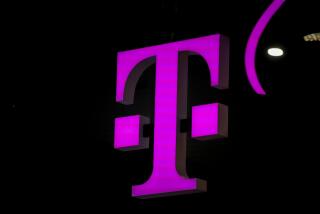Teledesic Wins FCC’s OK for Satellite License
- Share via
WASHINGTON — Teledesic Corp., a company owned in part by Microsoft Chairman Bill Gates, received federal approval for its ambitious network of 840 satellites that would deliver high-speed data, video, Internet access and phone service to customers worldwide.
The Federal Communication Commission’s approval of the license came Friday after the agency approved a Clinton administration plan ending a struggle over a block of radio spectrum held by Teledesic, a Kirkland, Wash.-based company owned by Gates, cellular phone magnate Craig McCaw and Associated Communications, a wireless company led by Alex Mandl, a former president of AT&T; Corp.
Alexandria, Va.-based Associated will relinquish a portion of the 18-gigahertz band of frequencies it holds so the government and Teledesic can operate satellite links without airwave interference. In return, the government will give Associated 400-megahertz in the 24-gigahertz band, which it will share with other licensees that offer similar wireless services.
Teledesic and Associated, who both acquired their airwave for free, would hold more than twice the amount of airwaves used by all of the nation’s radio and television stations combined. Teledesic still needs approval from the International Telecommunications Union in Geneva and deep-pocket investors for its $9-billion venture. As a result, the communications industry could soon be awash in more airwaves than it can profitably market.
For consumers, this could be a bonanza. Already, the prospects of increased competition has driven prices for several wireless telephone services to as low as a nickel a minute or less in markets such as Pittsburgh and San Francisco.
But experts say the amount of airwaves coming to market could decrease proceeds from future government auctions of the radio spectrum for wireless services. It also could produce a financial blood bath for companies now spending billions of dollars to introduce wireless technologies ranging from two-way paging, interactive video and advanced wireless voice telephony.
Indeed, at the FCC’s latest auction for wireless personal communications services, or PCS, companies seeking radio spectrum offered $2.4 billion--less than a quarter of the $10.1-billion bid during the PCS auction for the same amount of spectrum last winter. And experts say continued advances in technology that allow engineers to cram more signals over existing communications frequencies could depress the value of the airwaves even more.
“Except for a couple of large markets like Los Angeles and New York, we don’t think more than five wireless competitors can survive,” said Mark Lowenstein, director of Wireless Mobile Communications for the Yankee Group consulting firm in Cambridge, Mass. “I think we are going to see a wave of consolidation hit this market once we see a dose of reality set in.”
The huge new communications pipelines of Associated and Teledesic would add to what some analysts say is an overabundance of wireless capacity in the wake of the FCC’s efforts to more rapidly authorize new services.
In each of the nation’s major telecommunications markets, two frequencies are set aside for cellular phone providers. And being rolled out soon are half a dozen providers of wireless personal communications services, a nationwide mobile radio service being marketed by a company called Nextel, as well as several satellite ventures, such as Teledesic, that seek to offer mobile telephone service and Internet access in the United States and around the world.
And next month, the FCC will add to the new entrants when it auctions the largest single block of airwaves in history--1.2 gigahertz of spectrum for local multi-point distribution technology. This service will use a cellular phone-like system to deliver cable television, Internet access and telephone service to businesses and homes equipped with a compact disk-size antenna.
“In the next 18 months, there is going to be a huge amount of spectrum brought on the market; the competition will be phenomenal, and there may be a blood bath,” said Bennett Kobb, editor of SpectrumGuide, an Alexandria, Va.-based handbook on the radio spectrum.
But several veteran communications executives say the glut of new capacity will be temporary.
“I won’t discount some dislocations,” said Sam Ginn, chairman and chief executive of AirTouch Communications Inc., a San Francisco-based cellular phone provider that for the third consecutive year posted record profit and customer growth for the 1996. “But I think the domestic market still has plenty of room to grow.”






